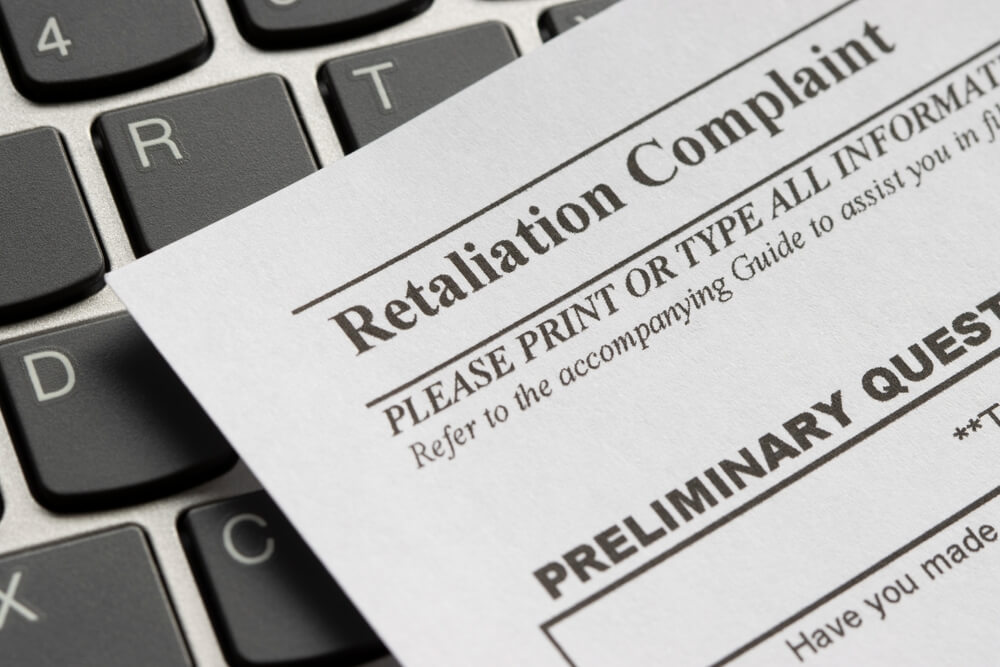Retaliation at work is illegal and should not be tolerated. Understanding how you should respond to retaliation in the workplace will help to better support any legal action you decide to pursue. In some cases, it’ll also help to protect you. Here’s a closer look at the steps you should take when figuring out how to respond to retaliation from your employer.
What Is Retaliation at Work?
Retaliation at work occurs when an employer takes adverse employment action against an employee for engaging in a protected activity. A protected activity is an action that an employee takes to oppose or report discrimination, harassment, or other unlawful conduct in the workplace. Examples of protected activities include:
- Submitting a complaint with the employer or a government agency regarding discrimination, harassment, or other violations of law
- Participating in an investigation into discrimination, harassment, or other violations of law
- Refusing to participate in discriminatory, harassing, or otherwise unlawful practices
- Advocating for the rights of other employees who have experienced discrimination or harassment
Retaliation can take many forms, such as:
- Pay cuts or reduced work hours
- Termination or demotion
- Refusal to provide reasonable accommodations for a disability or religious belief
- Negative performance reviews or disciplinary action
- Harassment or intimidation
Retaliation is illegal under federal and state laws. Employers who engage in retaliation can face legal consequences, including fines and other penalties.
If an employee believes they’ve experienced retaliation, they should report it to their employer’s human resources department or to the appropriate government agency. Having a detailed record of what has happened can help support your claim and increase the chances of a successful resolution.
Report Retaliation in Writing
When you’re experiencing retaliation at work it’s important to report it in writing. Reporting the retaliation in writing will begin a paper trail, which makes it easier for legal professionals to track the timeline of events. In addition, this will be very beneficial when filing a lawsuit against the retaliating employer.
When reporting retaliation, clearly state what happened and how it violated the law or company policy. Provide specific details, such as dates, times, and locations. An employee’s report should be professional and objective. Avoid using emotional language or making accusations. However, you should note the impact that each incident had on you, such as how it made you feel or how it affected your work. An employee should try their best to stick to the facts. Also, make sure to keep a copy of your report and any supporting documents for your records.
When to Seek Legal Counsel for Workplace Retaliation
Whenever you’re experiencing trouble in the workplace, you should always seek out legal counsel. Even if there isn’t enough to pursue a lawsuit, an employment lawyer can help you to determine how to document and properly react to retaliation. Here are a few instances when you should seek legal counsel:
- You have reported retaliation to your employer’s human resources department or a government agency, and the issue has not been resolved. A lawyer can help you understand your legal rights and options and guide you through the legal process.
- You have suffered significant harm as a result of the retaliation, such as losing your job or experiencing significant emotional distress. A lawyer can help you understand the potential damages you may be entitled to and help you pursue compensation for your losses.
- You believe that the retaliation is part of a larger pattern of discrimination or harassment. A lawyer can help you investigate the issue and determine if there is a larger pattern of illegal conduct in the workplace.
If you are unsure about whether to seek legal counsel, consider consulting with one of our employment attorneys for a free initial consultation.
Responding to Retaliation at Work

Whenever an employee believes they’re experiencing retaliation in the workplace, they should reach out to an employment lawyer immediately. A dedicated team of legal professionals can help you understand your legal options and determine if hiring a lawyer is the best course of action.
If you believe you’re experiencing retaliation at work, contact our team today!



